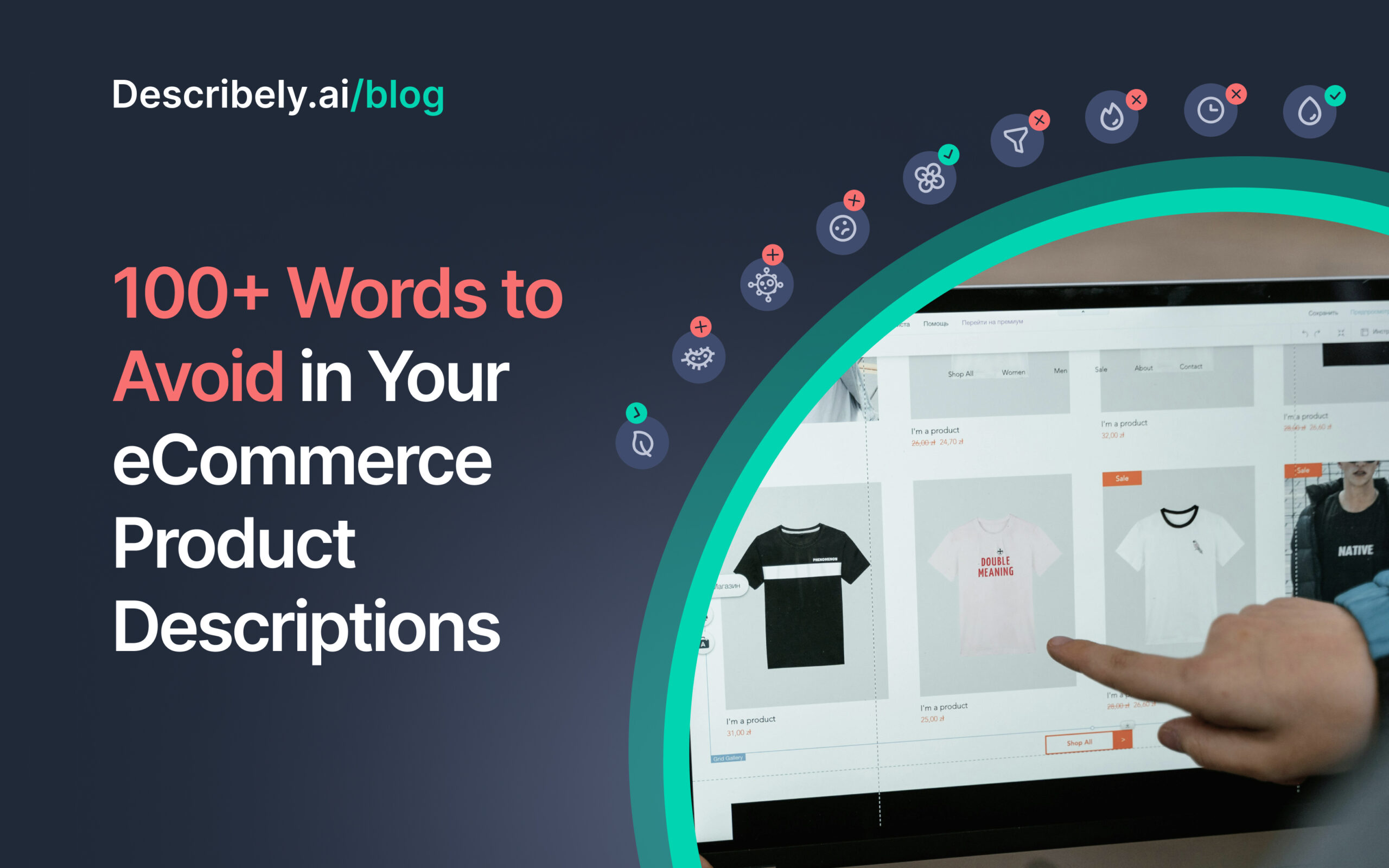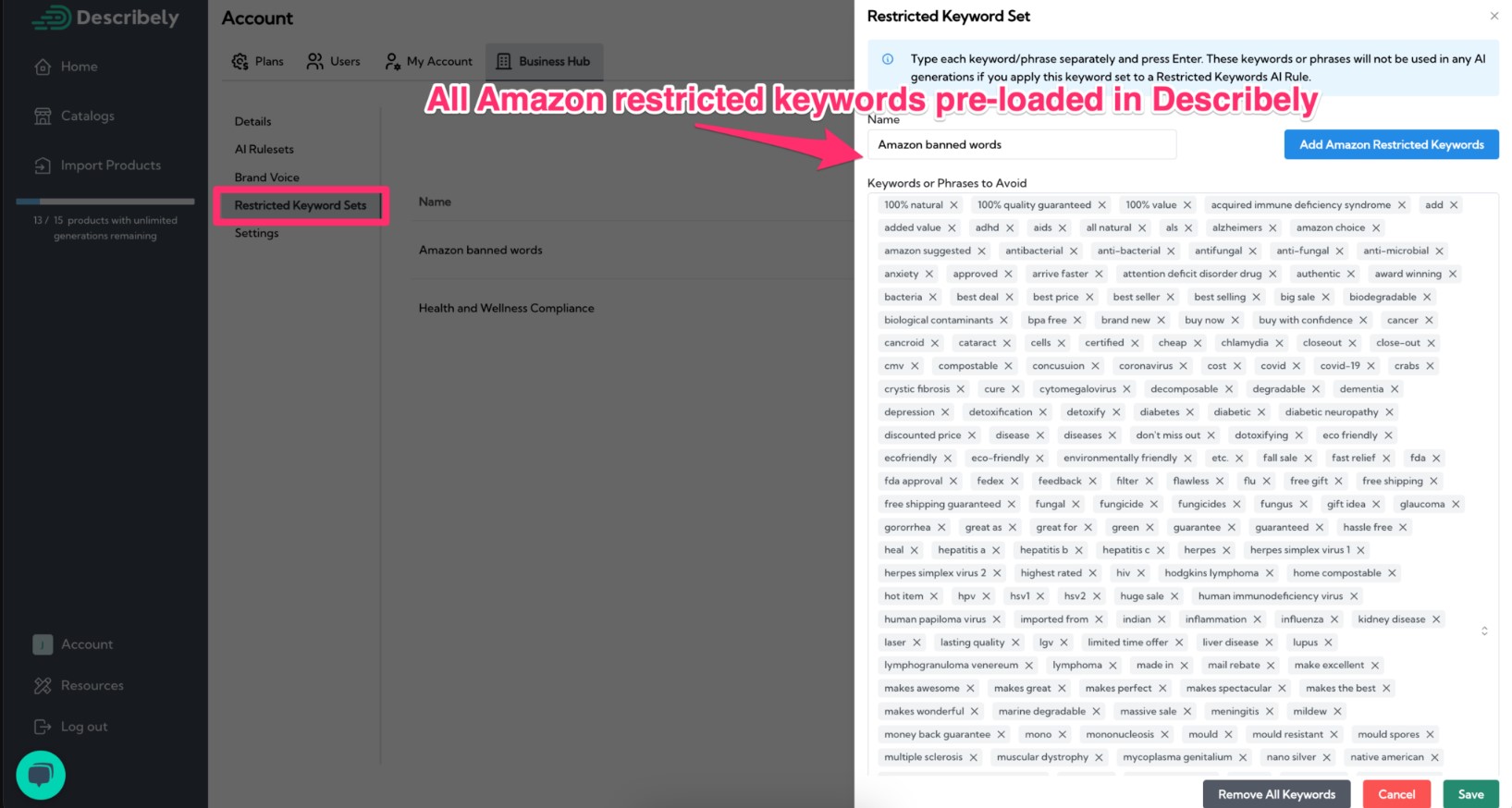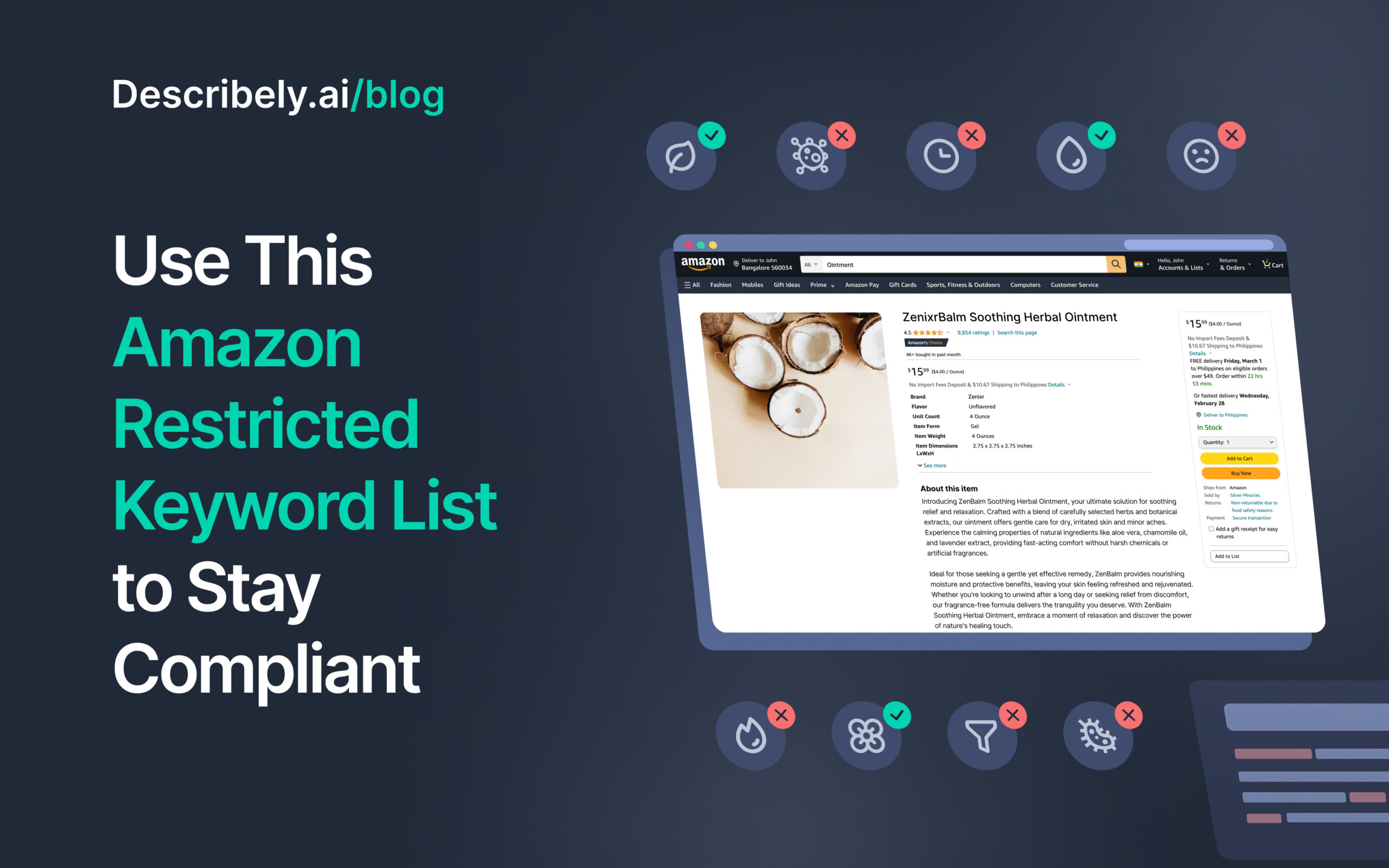
100+ Words To Avoid In Your eCommerce Product Descriptions
The words in your eCommerce product descriptions matter. Why? Because they can skyrocket your sales or, conversely, demolish them.
These words have the power to remove your product from platforms like Amazon or embroil your company in legal issues within tightly regulated industries.
As a professional in charge of eCommerce content, you know the pressure to create product descriptions that aren’t only persuasive and profitable, but also accurate and adhere to regulations.
We know how challenging it is to oversee this task. In addition, the complexity multiplies when your responsibility extends to managing hundreds of thousands of descriptions weekly across different team members, agencies, and AI tools.
That’s why we’ve created this article—to give you a detailed list of keywords to avoid regardless of what you’re selling and help you improve your product description word choice.
List of Words to Avoid in Product Descriptions
In this post, we categorize the keywords into three groups for easier reference:
- Restricted Words on Amazon. A list of words not allowed in Amazon product listings.
- Compliance and Legal Issues. These words and phrases could lead to legal issues or violate compliance standards in various industries.
- Deal Breakers. These terms might negatively influence how customers view your brand or product and could decrease the conversion rates of your listings.
Not all these words and phrases are explicitly prohibited. But they warrant careful consideration.
Note: If a word appears in multiple categories, it’s because it’s relevant to all identified areas, underscoring its significance and the need for caution.
1. Restricted Words on Amazon Product Listings
Amazon has a strict policy regarding product listings. It often removes products or bans listings that include any of its restricted keywords. Below is a comprehensive list of words and phrases that are off-limits on Amazon.
A to D: Restricted Words on Amazon Product Listings
| ‘100% natural’ | ‘arrive faster’ | ‘cells’ |
|---|---|---|
| ‘100% quality guaranteed’ | ‘Attention Deficit Disorder Drug’ |
‘certified’ |
| ‘100% value’ | ‘authentic’ | ‘cheap’ |
| ‘Acquired Immune Deficiency Syndrome’ |
‘award winning’ | ‘chlamydia’ |
| ‘ADD’ | ‘bacteria’ | ‘closeout’ / ‘close-out’ |
| ‘added value’ | ‘best deal’ | ‘CMV’ |
| ‘add to cart’ | ‘best price’ | ‘compostable’ |
| ‘ADHD’ | ‘best seller’ | ‘concussion’ |
| ‘AIDS’ | ‘best selling’ | ‘coronavirus’ |
| ‘affordable’ | ‘big sale’ | ‘cost’ |
| ‘all natural’ | ‘biodegradable’ | ‘covid’ |
| ‘ALS’ | ‘biological contaminants’ | ‘COVID-19’ |
| ‘Alzheimers’ | ‘bonus’ | ‘crabs’ |
| ‘amazon choice’ | ‘bpa free’ | ‘crystic fibrosis’ |
| ‘amazon suggested’ | ‘brand new’ | ‘cure’ |
| ‘antibacterial’ / ‘anti-bacterial’ | ‘buy now’ | ‘cytomegalovirus’ |
| ‘antifungal’ / ‘anti-fungal’ | ‘buy with confidence’ | ‘decomposable’ |
| ‘anti-microbial’ | ‘cancer’ | ‘degradable’ |
| ‘anxiety’ | ‘cancroid’ | ‘dementia’ |
| ‘approved’ | ‘cataract’ | ‘depression’ |
D to H: Restricted Words on Amazon Product Listings
| ‘detoxification’ | ‘fedex’ | ‘harmless’ |
|---|---|---|
| ‘detoxify’ | ‘feedback’ | ‘hassle free’ |
| ‘diabetes’ | ‘filter’ | ‘heal’ |
| ‘diabetic’ | ‘flawless’ | ‘hepatitis a’ |
| ‘diabetic neuropathy’ | ‘flu’ | ‘hepatitis b’ |
| ‘discounted price’ | ‘free gift’ | ‘hepatitis c’ |
| ‘disease’ | ‘free shipping’ | ‘herpes’ |
| ‘diseases’ | ‘free shipping guaranteed’ |
‘herpes simplex virus 1′ |
| ‘don’t miss out’ | ‘fungal’ | ‘herpes simplex virus 2′ |
| ‘detoxifying’ | ‘fungicide’ | ‘highest rated’ |
| ‘eco friendly’/ ‘ecofriendly’ | ‘fungicides’ | ‘HIV’ |
| ‘eco-friendly’ | ‘fungus’ | ‘hodgkins lymphoma’ |
| ‘environmentally friendly’ |
‘germ’ | ‘home compostable’ |
| earth-friendly | ‘gift idea’ | ‘hot item’ |
| ‘etc.’ | ‘glaucoma’ | ‘HPV’ |
| ‘fall sale’ | ‘gonorrhea’ | ‘HSV1’ |
| ‘fast relief’ | ‘great as’ | ‘HSV2’ |
| ‘FDA’ | ‘great for’ | ‘huge sale’ |
| ‘FDA approval’ | ‘green’ | ‘human immunodeficiency virus’ |
| ‘FDA cleared’ | ‘guarantee’ / ‘guaranteed’ | ‘human papillomavirus’ |
I to P: Restricted Words on Amazon Product Listings
| ‘imported from’ | ‘makes the best’ | ‘nontoxic’ / ‘non-toxic’ |
|---|---|---|
| ‘indian’ | ‘makes wonderful’ | ‘non-poisonous’ |
| ‘inflammation’ | ‘marine degradable’ | ‘non-injurious’ |
| ‘influenza’ | ‘massive sale’ | ‘noncorrosive’ |
| ‘kidney disease’ | ‘meningitis’ | ‘nongonococcal urethritis’ |
| ‘laser’ | ‘money back guarantee’ |
‘now together’ |
| ‘lasting quality’ | ‘mono’ | ‘no.1 product’ |
| ‘LGV’’ | ‘mononucleosis’ | ‘overstock’ / ‘over-stock’ |
| ‘limited time offer’ | ‘mold’ | ‘parasitic’ |
| ‘liver disease’ | ‘mold resistant’ | ‘parkinson’ / ‘parkinsons’ |
| ‘lupus’ | ‘mold spores’ | ‘patented’ |
| ‘lymphogranuloma venereum’ |
‘multiple sclerosis’ | ‘peal’ |
| ‘lymphoma’ | ‘muscular dystrophy’ | ‘pelvic inflammatory disease’ |
| ‘made in’ | ‘mycoplasma genitalium’ |
‘perfect for’ |
| ‘mail rebate’ | ‘nano silver’ | ‘perfect gift’ |
| ‘make excellent’ | ‘native american’ | ‘pesticide’ / ‘pesticides’ |
| ‘makes awesome’ | ‘native american indian or tribes’ |
‘pid’ |
| ‘makes great’ | ‘natural’ | ‘platinum’ |
| ‘makes perfect’ | ‘newest version’ | ‘plus free’ |
| ‘makes spectacular’ | ‘NGU’ | ‘professional quality’ |
P to W: Restricted Words on Amazon Product Listings
| ‘proven’ | ‘ships faster’ | ‘treat’ |
|---|---|---|
| ‘public lice’ | ‘shop with confidence’ | ‘treatment’ |
| ‘quality’ | ‘shop with us’ | ‘tribes’ |
| ‘ready to ship’ | ‘special offer’ | ‘trich’ / ‘trichomoniasis’ |
| ‘recommended by’ | ‘special promo’ | ‘tricht’ |
| ‘recyclable’ | ‘spring sale’ | ‘tumor’ |
| ‘remedies’ | ‘stroke’ | ‘unbeatable price’ |
| ‘remedy’ | ‘supplies won’t last’ | ‘UPS’ |
| ‘retail box’ | ‘summer sale’ | ‘used’ |
| ‘reviews’ | ‘super sale’ | ‘validated’ |
| ‘SAD’ | ‘TBIs’ | ‘viral’ |
| ‘sanitize’ | ‘tested’ | ‘virus’ |
| ‘sanitizes’ | ‘therapy’ | ‘viruses’ |
| ‘satisfaction’ | ‘top-notch’ | ‘warranty’ |
| ‘save $’ | ‘top quality’ | ‘weight loss’ |
| ‘save cash’ | ‘top-rated’ | ‘wholesale price’ |
| ‘save money’ | ‘top selling’ | ‘winter sale’ |
| ‘scabies’ | ‘toxic’ | ‘within hours’ |
| ‘seasonal affective disorder’ |
‘toxin’ / ‘toxins’ ‘toxoid’ |
‘world’s best’ |
| ‘seen on TV’ | ‘traumatic brain injuries’ |
The Describely.ai Advantage:
If you’re using Describely.ai, then you can easily automate the exclusion of these keywords from your product descriptions using Describely’s Amazon Restricted Keyword List

Interested in seeing it in action? Click here for a free trial.
2. Words That Risk Compliance and Legal Issues for Your Brand
To be safe from compliance problems, especially in heavily regulated industries like health, finance, and beauty, it’s important to avoid words that could imply unfounded claims, promise specific outcomes, or mislead consumers about the nature of the product.
Here’s a list of words and phrases that could get your brand in trouble due to compliance issues.
Note: Many of these words are entirely acceptable when you have the evidence or research to support your claims.
| Words to Avoid | Reason |
|---|---|
| ‘Cure’ | Implies the product can heal diseases or medical conditions, which can be problematic unless supported by scientific evidence. |
| ‘FDA-approved’ | Unless your product has been officially approved by the FDA, using this term is misleading and illegal. |
| ‘Guaranteed’ | Promising specific results can lead to compliance issues, especially without evidence to back them up. |
| ‘Clinically proven’ | Should only be used if true, with supporting clinical studies. |
| ‘Patented technology’ | Misleading if the product does not hold an actual patent. |
| ‘Detoxify’ | Often scrutinized in health and wellness products for lacking scientific basis. |
| “Instant relief” | Claims immediate effects that may not be substantiated. |
| “100% safe” | This can be misleading as safety can vary based on user conditions or misuse. |
| “Natural” | Regulated in many industries and misleading if synthetic ingredients are present. |
| “Organic” | It should only be used if certified, as it’s a regulated term. |
| “Non-GMO” | Requires verification if claimed. |
| “Scientifically engineered” | Implies a level of scientific backing that must be substantiated. |
| “Therapeutic” | It may imply medical benefits that need evidence. |
| “Free trial” | Can be misleading if not clearly disclosing the terms of the offer. |
| “Money-back guarantee” | Must be clearly defined and honored as stated. |
| “Lifetime guarantee” | Promises a long-term commitment that might not be upheld. |
| “No side effects” | Dangerous to claim unless thoroughly tested and verified. |
| “Patent-pending” | Should only be used if a patent application has been officially filed. |
| “Chemical-free” | Misleading, as nearly everything contains chemicals. |
| “Award-winning” | Misleading unless specifying the award and granting organization. |
| “Biodegradable” | Use only if you can prove that the product meets this claim. |
| “Hypoallergenic” | Requires evidence, as reactions can vary among individuals. |
| “Child-proof” | Use only if packaging meets specific regulatory standards. |
| “Eco-friendly” | Should be substantiated to avoid misleading eco-conscious consumers. |
| “Anti-aging” | Claims about reversing or stopping aging need solid scientific backing. |
| Words to Avoid | Reason |
|---|---|
| “Boosts immunity” | Requires clinical evidence to support immune system enhancement claims. |
| “Superfood” | While not strictly regulated, it can mislead consumers regarding health benefits. |
| “Sugar-free” | Similar to “fat-free,” it must adhere to legal definitions. |
| “Non-toxic” | Claims must be proven, especially for products in contact with skin or ingested. |
| “Zero calories” | Must be used for products that meet the regulatory criteria for calorie-free. |
| “All-natural ingredients” | Misleading if synthetics are used; every component must be natural. |
| “Fast-acting” | Claims about quick results need to be backed by evidence. |
| “Strengthens bones” | Health claims must be supported by clinical research. |
| “Improves memory” | Cognitive enhancement claims require substantial scientific proof. |
| “Lowers cholesterol” | Medical claims like this must be backed by solid evidence. |
| “Sugar control” | Implies medical benefits that must be validated. |
| “Calorie-burning” | Claims about aiding weight loss or metabolism need proof. |
| “Sweat-proof” | Product must undergo testing to uphold such a claim. |
| “Waterproof” | Should only be claimed if the product can be submerged without damage. |
| “Sun protection” | SPF claims must adhere to regulatory standards and testing. |
| “Non-allergenic” | Claims about being allergy-free need evidence, as allergies can be very individual. |
| “Biologically active” | Implies a product has a specific effect on biological processes that must be proven. |
| “Toxin-free” | Requires substantiation, especially in beauty and food products. |
| “Ethically sourced” | Claims about ethical practices must be verifiable. |
| “Sustainable” | Use only if sustainable practices are documented and verifiable. |
| “Fair trade” | Should be certified by an official fair trade organization. |
| “Pharmaceutical grade” | Use only for products that meet this high standard of purity and quality. |
| “Vegan” | Must not contain animal products or byproducts to claim this. |
While we’re not saying that power words for product descriptions like “Revolutionary,” “Exclusive,” and “Unbelievable,” are inherently harmful, you need to use them with caution. Also, instead of generic phrases, go for specifics that describe your product’s benefits and features.
Bonus: 20 Effective Product Description Words to Use
Now that we’ve covered words to avoid in e-commerce copywriting, let’s check some impactful keywords you can use.
Remember that although these positive words for product descriptions can work, you must ensure they are relevant and true to your brand and product.
| ‘calming’ | ‘premium’ |
|---|---|
| ‘comfortable’ | ‘refreshing’ |
| ‘convenient’ | ‘secure’ |
| ‘crisp’ | ‘skin-friendly’ |
| ‘durable’ | ‘slip-resistant’ |
| ‘eco-conscious’ | ‘smooth’ |
| ‘high-quality’ | ‘soft’ |
| ‘lightweight’ | ‘sturdy’ |
| ‘luxurious’ | ‘suitable for’ |
| ‘multi-functional’ | ‘travel-friendly’ |
Next Steps and Final Thoughts
You’re now equipped with three critical sets of words to exclude in product copy: words restricted by Amazon, words that could cause compliance issues for your brand, and words that could negatively impact your sales.
We understand how easily inappropriate words can slip through and jeopardize your products, brand integrity, and reputation. So, here are some steps you can take to avoid them at all costs:
- Add the keywords to your internal documentation. Extract the words from this post and integrate them into any key documents you use for crafting your messaging. If you maintain a brand guide, these keywords should find a home there.
- Share the lists among your team members and contractors. Provide access to these keywords and pitfalls to avoid with everyone involved in product content creation.
- Use Describely to avoid these words automatically. Describely lets you add these prohibited words and phrases to your Restricted Keywords List, safeguarding your content by preventing the AI tool from using any of them.



